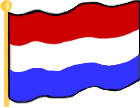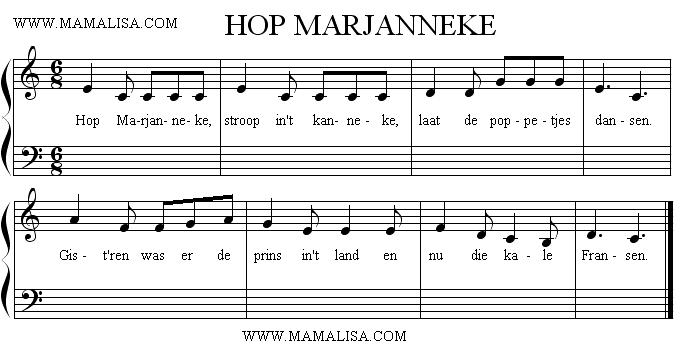Hop Marjanneke
This song was written during the French occupation of the Netherlands (the Batavian Republic 1795-1801) and is a protest song.
Hop Marjanneke
Hop, Marianne!
Children's Song
Children's Song
(Dutch)
(English)
Hop Marjanneke, stroop in het kanneke
laat de poppetjes dansen
eertijds was de prins in het land
en nu die kale Fransen.
Hop Marjanneke, stroop in het kanneke
laat de poppetjes dansen
hij wiegt het kind, hij roert de pap
hij laat zijn hondje dansen.
Hop, Marianne, syrup in the jug
Let the puppets dance
Yesterday we had a prince in the country
But now (we have) the bald French.
Hop, Marianne, syrup in the jug,
Let the puppets dance.
He rocks the child and stirs the porridge
And lets the dog dance.
Notes
Marleen wrote, "This is a rather difficult song to translate, because most of the lines have a deeper meaning.
'Marjanneke' is Marianne, the personification of the French revolution. 'Stroop in het kanneke' is a hidden way of saying 'strop in het handeke'. This means holding the rope to hang people. Letting the puppets dance means dangling from the rope.
In some versions it is not 'the prince' but the 'Pruis', who are the Germans (Prussians).
The 'kale fransen' are the French soldiers, who came to the Netherlands without money or goods, stealing from the locals. But it could also mean men without wigs, this is not certain. The sans-culottes.
The people of the Netherlands had sent Willem of Orange away and he went into exile in England. This could only be done with the help of the Germans and the French. But the occupation didn't turn out well, so many people wanted the prince back. His son came back to the Netherlands in 1814, to become our first king, since then the house of Orange has been our royal family.
The second verse is not clear, and there are many versions of it. Maybe just a repetition with some alteration in words."

Thanks and Acknowledgements
Many thanks to Marleen Fekkers for translating this song and for her interesting comments.
Dank u wel!


























